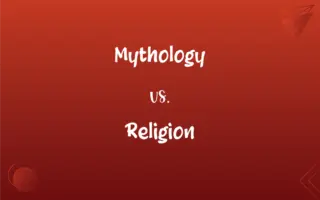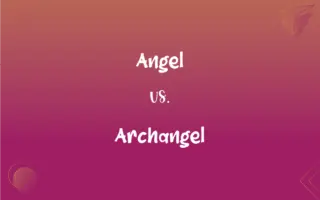Antithesis vs. Paradox: What's the Difference?
Edited by Harlon Moss || By Janet White || Published on January 19, 2024
Antithesis is the juxtaposition of contrasting ideas in balanced phrases, whereas a paradox is a statement that appears self-contradictory but reveals a deeper truth.

Key Differences
Antithesis and paradox are both literary devices used to enhance the expressiveness of language. Antithesis involves placing two opposite ideas in close proximity to create a contrasting effect, often in a balanced or parallel structure. A paradox, however, is a statement or proposition that, despite sound reasoning from acceptable premises, leads to a conclusion that seems logically unacceptable or self-contradictory.
The purpose of antithesis is to highlight the contrast between two opposing concepts, emphasizing their differences. It is commonly used to emphasize a point or to draw attention to a particular idea or theme. In contrast, a paradox aims to challenge the reader's understanding and encourage deeper thinking by presenting a seemingly absurd or contradictory statement that harbors a deeper, often hidden truth.
In terms of structure, antithesis is characterized by a clear and parallel contrast in language or ideas. It often follows a specific grammatical structure to enhance the juxtaposition. Paradoxes, on the other hand, are not defined by a specific structural format but rather by the nature of the statement itself, which defies conventional wisdom or logic.
An example of antithesis could be a phrase like "Speech is silver, but silence is golden," where two opposing ideas (speech and silence) are contrasted. A classic example of a paradox is the statement "Less is more," which contradicts itself on the surface but implies a deeper meaning about the value of simplicity.
The use of antithesis is often more direct and evident, making its presence and purpose clear in a text. Paradoxes, however, require contemplation and introspection, often leaving the reader pondering their meaning and the underlying truths they convey.
ADVERTISEMENT
Comparison Chart
Definition
Juxtaposition of contrasting ideas in balanced phrases
Statement that appears self-contradictory but reveals deeper truth
Purpose
To emphasize contrast and differences
To challenge understanding and reveal hidden truths
Structure
Characterized by parallel contrast
Defined by contradictory yet meaningful statements
Example
"Speech is silver, but silence is golden"
"Less is more"
Reader's Experience
Direct and evident contrast
Requires contemplation and introspection
ADVERTISEMENT
Antithesis and Paradox Definitions
Antithesis
Antithesis creates a clear distinction between two concepts.
Love is an ideal thing, marriage a real thing.
Paradox
A paradox is a statement that contradicts itself but reveals a truth.
I must be cruel to be kind.
Antithesis
Antithesis is a contrast of ideas by means of parallel arrangements of words.
It was the best of times, it was the worst of times.
Paradox
It challenges normal belief or wisdom.
The child is father of the man.
Antithesis
Antithesis often contrasts good and bad, light and dark.
Hate cannot drive out hate; only love can do that.
Paradox
It can be a tool for insight in literature and philosophy.
Freedom is slavery.
Antithesis
It emphasizes opposing qualities in a balanced manner.
To err is human; to forgive, divine.
Paradox
Paradox is used to express complexity of reality.
War is peace.
Antithesis
Used to produce a striking effect in literature.
Man proposes, God disposes.
Paradox
Paradoxical statements often sound absurd or impossible.
This statement is false.
Antithesis
Direct contrast; opposition.
Paradox
A person, thing, or situation that exhibits inexplicable or contradictory aspects
"The silence of midnight, to speak truly, though apparently a paradox, rung in my ears" (Mary Shelley).
Antithesis
The direct or exact opposite
Hope is the antithesis of despair.
Paradox
A statement that seems to contradict itself but may nonetheless be true
The paradox that standing is more tiring than walking.
FAQs
Can antithesis be found in everyday language?
Yes, it's common in expressions and proverbs.
What is antithesis?
A rhetorical device contrasting two opposite ideas.
Is a paradox always true?
Not literally, but it often contains a deeper truth.
Is antithesis the same as contrast?
It's a specific form of contrast in writing.
How is antithesis used in literature?
To emphasize contrast and highlight differences.
What is the purpose of a paradox?
To provoke thought and reveal hidden truths.
Do antitheses always use parallel structure?
Typically, to enhance the contrast.
Can a paradox be solved?
It's more about insight than solving.
What is a paradox?
A statement that contradicts itself but reveals a deeper truth.
How does antithesis affect the reader?
It clarifies and emphasizes differences.
Can paradoxes be factual?
They're more about perceived contradiction than fact.
Can a statement be both an antithesis and a paradox?
Rarely, but possible if it contrasts ideas in a paradoxical way.
What makes a good antithesis?
Clear, balanced contrasting of ideas.
How do paradoxes impact philosophical thinking?
They challenge conventional wisdom.
Can antithesis be humorous?
Sometimes, especially in witty contrasts.
Are all paradoxes ironic?
Many are, but not necessarily all.
Why are paradoxes important in literature?
They add depth and stimulate thought.
What makes a paradox effective?
A surprising contrast between statement and truth.
Do antitheses have to be opposites?
Yes, they involve direct opposites.
Is antithesis common in speeches?
Yes, it's often used for emphasis.
About Author
Written by
Janet WhiteJanet White has been an esteemed writer and blogger for Difference Wiki. Holding a Master's degree in Science and Medical Journalism from the prestigious Boston University, she has consistently demonstrated her expertise and passion for her field. When she's not immersed in her work, Janet relishes her time exercising, delving into a good book, and cherishing moments with friends and family.
Edited by
Harlon MossHarlon is a seasoned quality moderator and accomplished content writer for Difference Wiki. An alumnus of the prestigious University of California, he earned his degree in Computer Science. Leveraging his academic background, Harlon brings a meticulous and informed perspective to his work, ensuring content accuracy and excellence.






































































